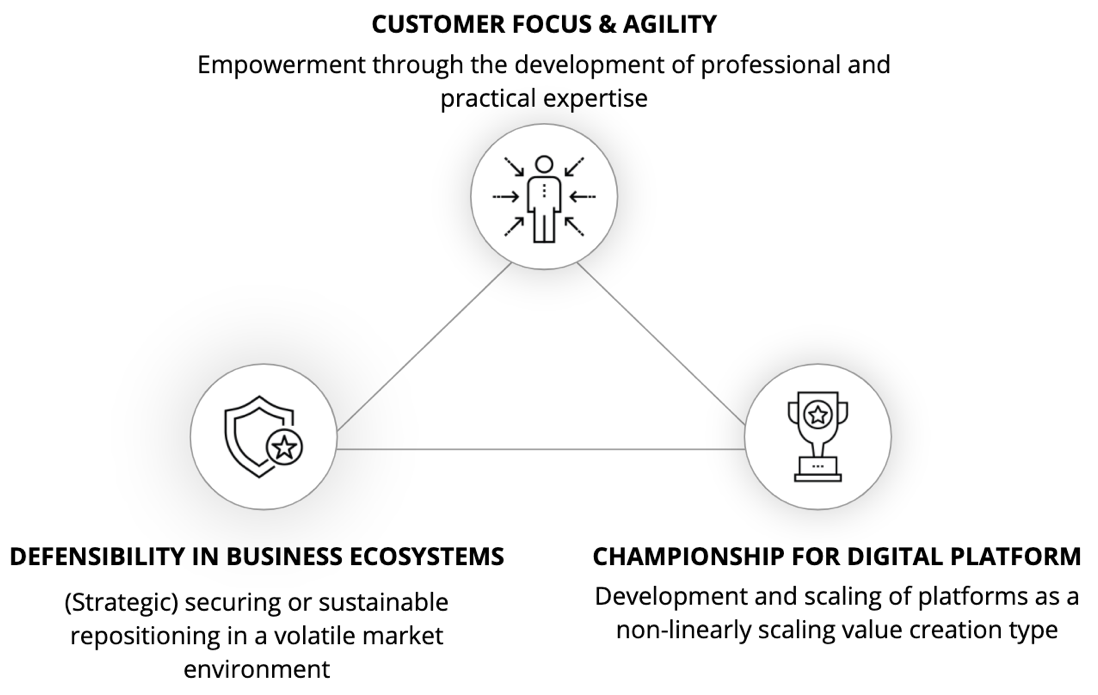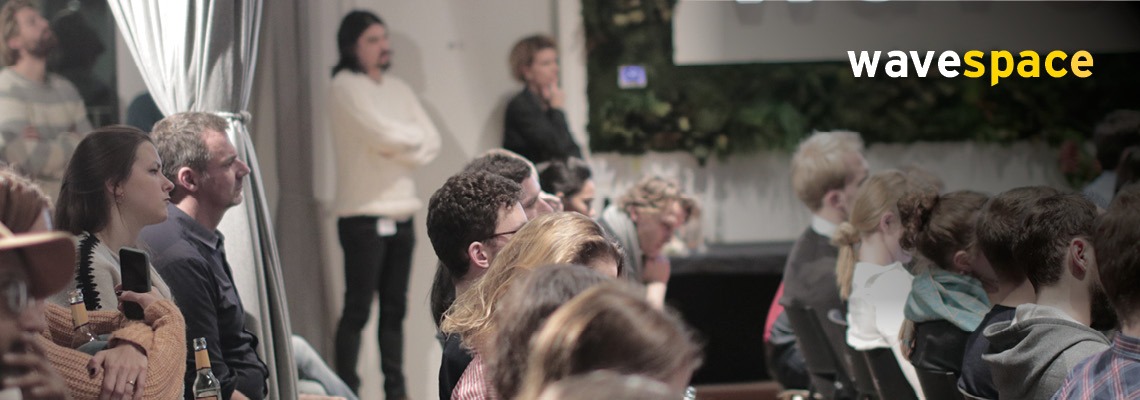Value creation in the digital age – monopolisation, networking or demise!
26. February 2020
Why German SMEs must act now and how digital platforms can help.
Platforms are the central business model of the digital economy. Seven of the ten most valuable companies are now operating as interaction managers between supplier and consumer. Because platforms have many competitive advantages over traditional linear companies, they are also becoming increasingly popular in business-to-business (B2B) markets. Unlike the consumer business, where Amazon & Co. have long dominated every area of life, the race for digital platforms in B2B has only just begun. The traditional players have a good chance of asserting themselves against the tech giants with their own platforms. Why and for which companies the entry into the platform economy is now essential and what the alternatives are, explains this contribution of etventure’s Platform Competence Center.
Digitalisation is increasingly changing the traditional economic systems. All industries are now affected and experience its profound impact. Because the way value creation is conducted in the digital age is increasingly based on linking software with hardware. This is based on two strategies: the monopolisation of value creation through control and ownership of the central elements on the one hand, or the intelligent networking of value creation elements in increasingly complex ecosystems on the other.
Tesla impressively demonstrates how the former works. All key technologies and important components are owned by Tesla, everything is centrally controlled by software. What Tesla buys from outside are commodities – only standardized bulk goods in the classical sense. Of course, this requires a broad know-how, a lot of capital investment and also a portion of luck when choosing the long-term corporate strategy. Only very few companies have this. German medium-sized companies may possess valuable industrial knowledge, but financial resources are limited and luck is hard to plan.
The means of choice for small and medium-sized businesses in particular should be participation in a networked value creation
Networked value creation takes place in so-called digital ecosystems on a global level. The role models are mostly US and Asian companies in the B2C segment such as Amazon, Uber, Alibaba or Ping An Insurance, which have established successful business models by intelligently networking producers with consumers as well as tangible and intangible products. This logic is increasingly becoming crucial for success in the B2B segment, otherwise Kodak-like failure threatens. And there are already successful role models from Germany, including the steel trader Klöckner, which has developed a digital marketplace for the steel market, with which the company already generates sales in the billions, or the polymer manufacturer Covestro.
For SMEs, this means that in order to continue to play a leading role in the international market in the future, they must finally become active and question the traditional mechanisms of value creation and adapt them to ecosystem networking.

What does networked value creation in digital ecosystems mean?
In the classical economic context, an ecosystem is understood as the community of all value-creating actors in an industry and their relationship to each other. In the age of digitization, clearly defined industries are blurring and become increasingly dynamic and thus more and more complex. This development is mainly driven by changing customer requirements and progressive technological and social developments. Customer needs are becoming more unpredictable because they are increasingly individualizing. Serving them requires tailor-made products and value propositions from new cross-sector product-service systems outside the traditional value chains. Individual companies are less and less able to serve these in an economically scalable way.
Therefore, the overarching goal of an emerging “digital” ecosystem for value-creating actors is: to overcome complex dynamic challenges in a scalable and efficient way. The American and Asian companies mentioned at the beginning have shown that value creation networks built specifically from the user’s perspective can successfully serve the needs of all participants.
Who benefits from ecosystems?
By 2025, these new ecosystems are expected to generate 30 percent of global revenues. Especially in the B2C segment there are already numerous examples, while ecosystems in the B2B segment are still in the early stages of development. And yet indicators of this change can already be seen in almost every industry. For example, in the logistics sector, where over ten thousand companies at various stages of the value chain (producers, traders, transporters and customs) can be networked via a platform provided by the US start-up Flexport to organize the flow of goods efficiently and transparently. Distribution platforms such as the one already mentioned by Klöckner or Lanxess’s Chemondis orchestrate suppliers and demanders beyond traditional sector-specific supply chains. The platforms were built up step by step with a 100% focus on the benefits for both suppliers and buyers. Another example: In the commercial real estate and construction industry, approaches are being developed to offer everything from a single source – from financing and acquisition to renovation and furnishing – via intelligent networking of offers within an ecosystem.

Platforms as a starting point for digital ecosystems
Most approaches use the same starting point for building and operating a digital ecosystem: a digital platform. “It’s about something fundamental: To secure the sustainability of our company in the long run”, Klöcker CEO Gisbert Rühl is convinced. And: “Platforms will become the dominant business model of the 21st century – that was the initial spark for our digitization strategy”.
The digital platform connects the ecosystem in the activities of suppliers and consumers based on the appropriate technology. The platform is the instrument for orchestrating and processing the complex dynamic system of customer needs and suitable offers, because it integrates partners who support the exchange and provide additional services (e.g. suppliers, payment providers, logistics providers) in a value-adding manner. Gradually, the platform links a complete system with complementary products across industries and can thus satisfy a spectrum of customer needs. The platform operator optimizes further expansion and the interaction between suppliers, customers and other partners.
What medium-sized businesses need to be successful
Digital ecosystems, with platforms as an instrument, are becoming an integral part of the corporate landscape. Whether as a central operator, provider, partner or in a hybrid role – for established companies a platform and thus an ecosystem strategy is a prerequisite for being competitive in the future.
The current etventure study shows that many traditional companies and corporations are lulling themselves into a (false) sense of security. For many traditional companies, digitization still “only” means higher productivity through the digitization of existing processes. Innovation and new business models play only a minor role: Only one fifth of the measures in the companies (21 percent) are aimed at developing new digital business fields. This is worrying, because those who stay out of it now risk missing the boat and leave the value creation to others.
In order to future-proof themselves in the age of networked value creation, companies need a strategic platform concept. In other words: an assessment of the development of industries and markets, a deep understanding of potentially relevant ecosystems as well as their options for action in them. What is your own role in the ecosystem? What synergies and market opportunities are there for combining the own capabilities and corporate values with customer needs?

The Competence Center Platforms & Ecosystems of etventure/EY is bundling all competencies for the age of networked value creation
Although it seems lucrative to be the central operator, not every company is qualified for this role. New business fields can also be developed as a partner. Hybrid strategies that pursue both approaches in parallel are also possible. In areas with a very good market position, own ecosystems are developed, in other fields cooperation with third-party platforms is pursued. Ecosystem mapping can be used to identify potential areas at an early stage; a target vision defines the direction of development. A starting point is usually the own industry, then further services are systematically integrated, which customers would otherwise purchase decentrally.
Making the transition to a digitally controlled business model is not only important to set yourself apart from the competition, it is also vital for survival. This creates the opportunity to survive in the market and continue to grow with the right strategy for positioning within digital ecosystems and the right instruments for implementation.
About the Competence Center Platforms & Ecosystems
The CC Platforms & Ecosystems from etventure bundles all competencies for the age of networked value creation. It not only develops strategic designs and target definitions, but also implements these with clients, primarily from the B2B sector of various industries. Furthermore, the CC enables companies as well as external and internal employees to realize their own platform-based projects with a variety of methodical tools and approaches.
Autor: Sebastian Wolters, Management CC Platforms & Ecosystems
Co-Autoren: Christian Boettcher, Head of CC Platforms & Ecosystems and Inga Stange, Expert Platform Value





* Required field